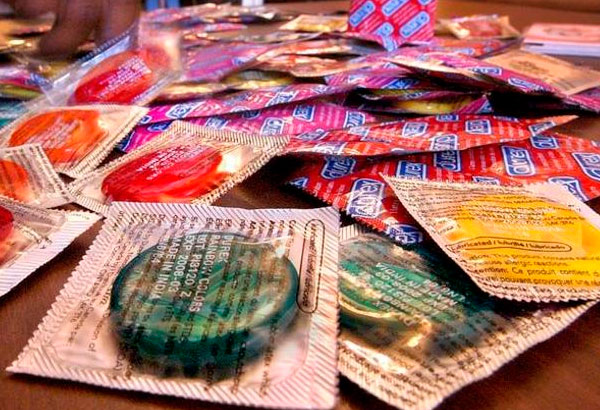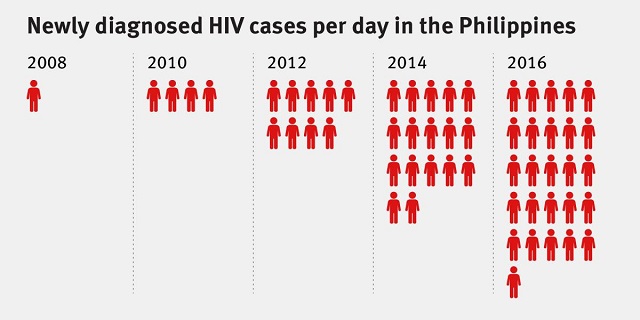HRW urges gov't to promote condoms to curb HIV epidemic

A stigma around buying and using condoms discourages many from having protected sex, a new Human Rights Watch report said. File photo
MANILA, Philippines — The government must work to promote condom use—particularly among men who have sex with men—to help stem a rise in HIV cases in the Philippines, where 32,647 diagnosed cases have been reported since 1984.
In a new Human Rights Watch report and in an interview with Philstar.com, HRW researcher Carlos Conde said there is hardly any advertising for condoms and none at all for MSMs, a term for men who have sex with other men regardless of their gender identity.
This, despite government data showing a tenfold increase in infections among MSMs between 2010 and 2015. The Department of Health Epidemiology Bureau reported in March that sex between males was the most predominant mode of transmission among males diagnosed with HIV since 1984 at around 81 percent.
Transmission through male-female sex is at a much lower 13 percent of cases.

The number of HIV cases in the Philippines has risen to around 35,000 in 2016 from 2 in 1984. Image: Human Rights Watch
The HRW, citing June data from the DOH's quarterly surveillance report, said that condom use among MSMs was low, with just 44 percent saying they used a condom in their most recent sexual encounter. Of those who didn't use condoms, more than 61 percent said they didn't because condoms weren't available.
In some cases, patients did not even know about condoms at all. HRW notes that "millions of Filipinos are not sufficiently educated about the role of condoms in preventing HIV transmission," citing DOH data that only one out of five MSMs have basic knowledge of HIV.
Part of the problem is a lack of what Conde called the "mainstreaming" of condom use. Although readily available in most convenience stores and pharmacies, "the fear of being ridiculed by retail store staff creates a strong disincentive to using condoms," HRW said in its report.
Chard, a peer educator for an HIV support group in Cebu City, said in the report that many men who have sex with men are embarrassed to buy condoms because "the clerks and cashiers couldn't help looking at them as if they've done something wrong." He said that many felt that they were being judged each time they bought condoms.
If condom purchase and use is stigmatized, it is more so for MSMs, to whom condoms are not even marketed at all. Conde said that there are few advertisements for condoms in the media and all of those are targeted at heterosexuals.
There is little promotion, he said, of where people can get condoms and how to use them, a problem compounded by inadequate sex education classes in schools that teach it at all.
The lack of sex education can be attributed to teachers not being trained how to talk to students about sex or being embarrassed to do so.
There can also be opposition in some more conservative schools and from pressure groups that believe parents should be the ones to educate their children about sex.
HRW said the government needs to develop a national program that promotes condom use and that addresses misconceptions about condoms. It said the program should play particular attention to MSMs, being the sector most at risk of infection, according to government data.
Distribution in schools
Health Secretary Paulyn Ubial has already announced that the DOH will begin distributing condoms in schools by next year. She said that this can be done once the department and the Department of Education work out the details of the program.
"But before the distribution, there will be counseling so we can prepare the schools, teachers and the students," Ubial also said.
Conde called the move a big development, noting that the last Health secretary made a firm stand to promote condom use was when Dr. Juan Flavier headed the department. Flavier, who died in 2014, was Health secretary from 1992 to 1995.
He said, however, that the method of distribution matters as well. If students need to approach a teacher to get condoms, then the program might fail because students might be too afraid or too embarrassed to so. He said that in some countries, condoms are distributed through dispensers in school restrooms.
The Department of Education, meanwhile, said on Wednesday that it will hold thorough discussions with Ubial's department in its plan to distribute condoms. Parents' "right and responsibility to educate their children" on sex should not be compromised, the education department added.
Conde said that President Rodrigo Duterte, who has expressed support for the LGBT community in the past, is in a unique position to, in a way, declare a war on the HIV epidemic.
"The Duterte government has a golden opportunity to remedy the legal and policy errors of previous administrations by implementing proven low-tech and low-cost interventions that can help stop in its tracks the country’s HIV epidemic among men who have sex with men," Conde said.
"Failure to do so will only ensure that the already alarming number of new HIV infections among men who have sex with men will continue to rise."
- Latest
- Trending

























